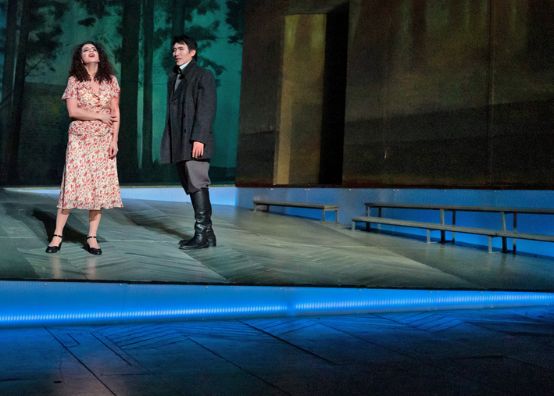"Schloss Dürande" back on the stage
Othmar Schoeck's last opera was staged for the first time in the Micieli/Venzago version at the Meininger Staatstheater.

It is hard to imagine that an opera that is said to be the major work of one of the most important Swiss composers of the 20th century would disappear from the repertoire for 76 years after its premiere at the Berlin State Opera and a Zurich fiasco. Only those who take a closer look, remember the circumstances and carefully read the original libretto will quickly gain an impression of what happened and why it happened. Despite numerous, often futile interventions, Othmar Schoeck as composer was all too careless with a libretto created by Hermann Burte: with the possibility of an exposed production in mind and presumably also without any contemporary assessment of reality. The entire Castle-Dürande-Burte's völkisch sentiments permeate the text (sometimes clearly, sometimes subcutaneously), but it is even poorer in quality. Even Hermann Göring sent a telegram expressing his astonishment as to how the opera, which premiered on April 1, 1943, and the libretto on which it was based, which was described as "laid-on bullshit", could be accepted by the artistic directors.
However, the opera was banned after the Second World War when it was performed in the brown Berlin, although it was already clear after the first performance that it was musically an important score. However, it was not possible to denazify the work; the facts stood in the way of the work just as much as the clumsy attempts to blame the composer's good faith for his criminal lack of scruples. It is therefore all the more astonishing that Schoeck's Dürande Castle is scathingly reviewed in the popular literature, but there is always a certain curiosity about the music. And rightly so, as could now be heard at the Meininger Staatstheater. A score with a text newly arranged by Francesco Micieli and carefully worked into the vocal lines by Mario Venzago lay on the desks. Academically reappraised and accompanied by two publications supported by the Swiss National Science Foundation, the problem opera has thus become a historically belated grand opéra: At the center is the fate of Renald Dubois (initially still a count's hunter concerned about his sister, later a fervent revolutionary in his own right), who determines the tragic end of all. Four different acts can be heard, from film music adaptations and astonishingly retrospective moments to Wagnerian travails and the jazz of the 1920s and 1930s. Schoeck thus summarizes a truly "long" 19th century and goes beyond it - without eclecticism, but with the idea of the widest possible availability.
What is initially surprising, however, gains coherence and independent, even idiosyncratic consistency. But questions remain unanswered. For example, Micieli's new version of the libretto, which is based on a novella by Eichendorff, has been a splendid rescue. Admittedly, he was unable to correct where the text was already retarded in the original and Schoeck follows it for (too) long in the score. This time, however, nobody wanted to cut back on the musical-dramatic substance. For example, a slight shadow remained on the finale when Renald learns the truth about his sister from the dying servant Nicolas. In future productions, the director will have to find solutions here (possibly using multimedia?). Speaking of the future: the Dürande Castle has earned a chance to prove itself on other stages in this neutralized, occasionally still overly rhyming form. Brahms had already chosen the small but beautiful Meiningen for the premiere of his 4th Symphony in order to test it carefully. However, Schoeck's last opera will probably not become a repertoire piece. The choice of subject alone makes it too retrospective, especially at a time when the world was in flames. The premiere success of the production (directed by artistic director Ansgar Haag, musical director: GMD Philippe Bach) was in any case fully justified with a solidly accompanying, but hardly interpretative staging, a respectable ensemble performance and an outstandingly well-disposed court orchestra.
Further performances
March 29, April 28, May 8 and 17, June 27 and 30, July 6, 2019
meininger-staatstheater.de








